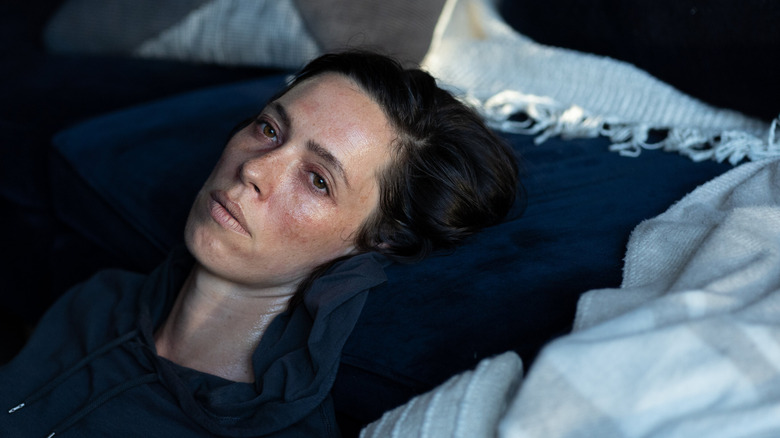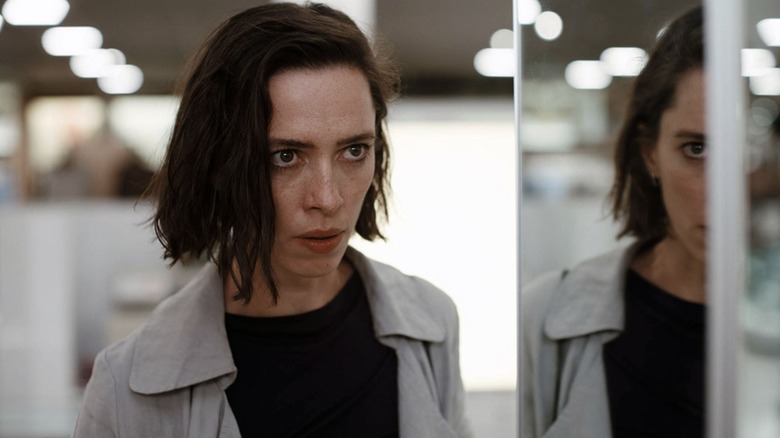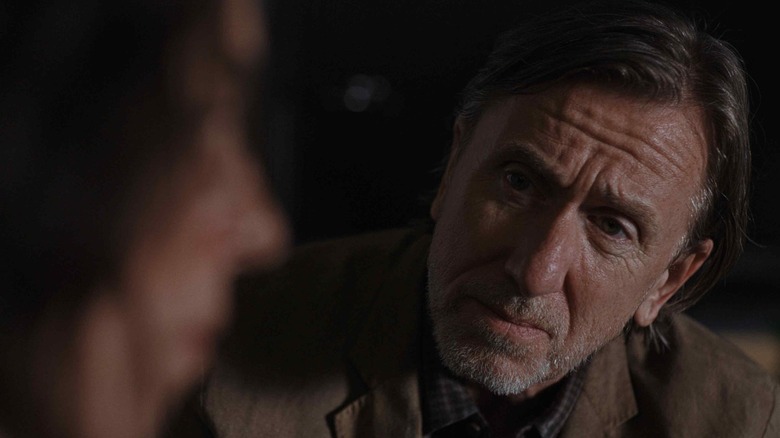Resurrection Director Andrew Semans Always Had That Big Ending In Mind [Interview]
"Resurrection" is a startling vision. Writer/director Andrew Semans often uses the mundane to create suspense and unease, giving the audience the sense that a monster is always waiting around the corner. In the horror film, the monster (played by Tim Roth) returns from Margaret's (Rebecca Hall) past with a singular goal in mind. Without spoiling it quite yet, let's just say the movie concludes with an ending no one will see coming at the start.
It's an ambitious conclusion. At one point during a recent interview, Semans told us he even "chickened out" and wrote a more conventional finale out of fear it was too much, whether for financiers or audiences. But thankfully, he quickly realized his first instincts were correct and returned to his bold ending, and in our conversation, he told us about working with Rebecca Hall and why he was adamant about keeping that powerhouse conclusion in tact.
'We knew how incredible she is'
When Rebecca Hall performs the monologue in the long take, what was your reaction on the day?
The reaction of the whole group was just ecstatic, because it's a risky thing to do. It's a scary thing to do and have a long monologue, all in one take, in the middle of a movie. In this case, if it doesn't work, we're kind of dead in the water. There's no recovery from that. Now, by the time we shot that, we had been working with Rebecca for a couple weeks. We knew how incredible she is, so I think confidence was fairly high that she'd do well with the monologue.
We shot the first take, and I think within about 10 seconds of her delivering the monologue, I was over the moon. I was like, "She's got it. She's locked in. It's going to be extraordinary." She did one take and it was great. Then we did one more take and it was equally great, albeit slightly different because Rebecca always does things differently from take to take, which is amazing. We did two takes and that was it. We were like, "We got it."
Did you use take one or two for the film?
We used take two. I would say take one is equally good, just a little bit different. We went back and forth, but we used take two.
What were the subtle differences in her performance between both takes?
I think the reason we went with take two, more so than anything else, is it was just better for the camera. But the differences were the first take was a little looser, it was a little longer and it had a little more anger in it, I felt. That's what I was detecting, that there was a little more rage in her voice and in her description of this past experience.
The second take, to me, felt like there was more tragedy, there was more of a sense of loss. We ultimately went with the second take, but like I said, I think the movie would be — and the scene would be — equally satisfying, equally interesting with either one. She didn't drop a line in either take.
What effect did you want that long take to have on the audience?
I think to cut away in the middle of something like that would've been a very bad idea. I think it would've taken the audience out of it. It would've compromised the performance or it would've felt like we were cutting around when we didn't need to.
The whole idea of that monologue is we're trying to be immersive in her memory. We're trying to focus specifically on her experience in the past and her falling back into that experience. It just had to be in this single take.
It's just a person talking. It is kind of theatrical, but we wanted it to be immersive. For that to be truly immersive, I think we had to just focus precisely on her face, her performance. Otherwise, people might have gotten restless, distracted, so we had to keep laser-focused on what she was doing.
It's great to get to enjoy the performance, too. Sometimes it can be frustrating watching a great performance, then the camera cuts away.
Right. Sometimes you, of course, have to cut away for one reason or another, or maybe you want to engage with a different take on the person giving the great performance, so you cut away. But yeah, I hate that feeling when I'm watching something and I'm seeing a really exciting moment, and then there feels like an unnecessary cutaway. And it is deflating. In the script, at a certain point we took them out. I had written in flashbacks, into the monologue, but it was more just to kind of cover myself because I was worried that people reading would scoff at this monologue. And now, in retrospect, had we included flashbacks, it just would've been terrible. It would've been a disaster.
What were the specific flashbacks?
There were just flashbacks to images, moments, from the experience she's describing. We never even shot them. It was something that we, especially after we shot the monologue, it was clear that they would be extraneous and we wouldn't use them.
'From the first draft to the last'
Visually and audibly, how did you want to express Margaret's point-of-view?
Every decision we make was based on what Margaret has experienced in any given time. Even though the movie is presented visually, at least in a kind of grounded, objective, or naturalistic way, the idea was that everything we do is meant to communicate her state of mind.
One way we tried to stay in her head all the time was to take a very different tack with the sound design. It is very subjective, which is much more stylized than the visual approach. What you're looking at feels like the real world feels, rather mundane. I mean, I think it's a handsome film, but it is not very expressionistic. In the audio environment, it is something that is very much reflective of the character's emotional experience in that moment. So that's one way we were trying to subtly evoke her mental state.
Can you talk about making the decision to not have it be overly stylized, visually?
It felt like if we took a much more fluidly stylized approach, much more expressionistic approach, it would just feel like a movie about a woman going crazy, which I did not want. I didn't want to make that movie and I didn't want to get that sense. Also, because the story is pretty outlandish, pretty strange, I didn't want to ... it felt like if it took a more Darren Aronofsky approach — nothing against Darren Aronofsky, I love him, but [he makes] very stylized movies — it would just feel like too much. It wouldn't feel grounded in reality anymore. It would just feel like hallucination or a dream from the jump, and we didn't want to do that.
One of the things that was important to me was that I didn't want to spend the movie undermining her, or winking at the audience. Or saying, "Oh, you can't trust this woman." Everything we did was as if everything she is saying is true, is reliable. And yeah, that was important to me.
[Warning: Spoilers ahead.] Was the ending the finale you always imagined?
Always in, yeah. From the first draft to the last. There were many variations on that ending, but the actual, the action, what Margaret does to David and what she finds after she does it, that was always the ending. I did write a draft, because I was getting nervous or chickening out, where there was an ending that was a little bit more realistic, I would say, but that didn't survive very long. It always ended this way.
Why were you adamant about this ending?
A couple of things. I wanted to make a movie where it was a very slow burn, a very gradual, incremental building of tension. And then, something that bursts open and becomes operatic, becomes sensual, has a really big ending and even bursts into a different genre. I love the idea of trying to make that work emotionally, dramatically. I like that contrast.
It was very important to me, after putting this character, Margaret, through everything she goes through in the movie, I felt I had to give her her happy ending. Whether it's truthful or not, whether it's fantasy or reality, I had to see what the perfect ending was for this character.
As I understand the character, everything that happens, including the violence and what she does to David, and then the epilogue is precisely as she would write it if she was writing it herself, where she gets her redemption and everything she wants. I just needed to see that.
You could watch this movie and because the ending is impossible, it could suggest that the underlying truth of the matter, what actually happens, is far more tragic than what we see in the scene. But I didn't want to see that tragedy. I wanted to see her victory. I wanted to see her redemption. I wanted to have that catharsis.
"Resurrection" is now playing in theaters and will be available On Demand starting August 5, 2022.


